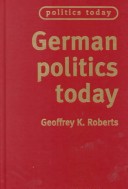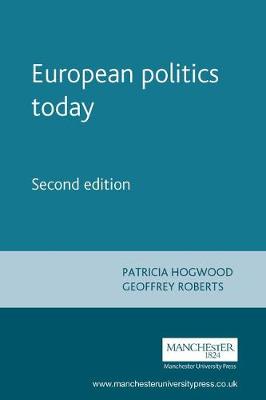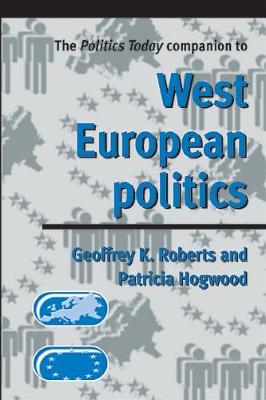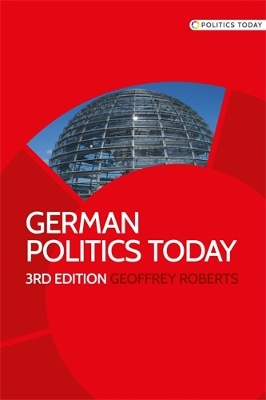Politics Today
4 total works
A survey of the German political system, based on information covering the period since the 1998 Bundestag election and the new coalition government under Chancellor Schroder. An overview of the historical background to the present-day political system, including the steps that led to German reunification in 1990, is followed by analysis of the institutions of political participation (election, parties and interest groups) and the institutions of government (the constitution, the legislature, chancellor government and the federal system). The book concludes by considering the symbiotic relationship between Germany and Europe, and assesses how apt it is to consider Germany to be a "normal" democracy today. The author draws on German as well as English-language sources of data, and special features include boxes explaining certain topics, a chronology of events leading to German reunification, and examples of interest groups officially registered with the Bundestag.
In the new edition of this successful textbook on European politics, Patricia Hogwood and Geoffrey Roberts offer a comprehensive introduction to the political systems and processes of western Europe. They demonstrate clearly that political decisions are not made in a vacuum, but in the context of specific historical constraints and social demands. This book begins with an overview of the features and events which have shaped the political landscape of Europe up to the end of the twentieth century. The authors go on to discuss liberal democracy, historical sources of conflict between countries, electoral systems, political parties and interest groups, governments and parliaments. The final section looks at federalism and EU decision-making and concludes with a consideration of how liberal democracies in western Europe have attempted to provide stable government while remaining responsive to changes in society.This book has been fully updated to take account of the French, British and Italian general elections that have occurred in recent years, as well as the momentous changes that have taken place in global politics as a result of the September 11 terrorist attack, and the preparations for EU enlargement.
The chapters on the European Union and democracy in western Europe have also been substantially revised to take account of globalisation and recent political corruption issues.
The chapters on the European Union and democracy in western Europe have also been substantially revised to take account of globalisation and recent political corruption issues.
The Politics Today Companion to West European Politics
by Geoffrey Roberts and Patricia Hogwood
Published 17 April 2003
Providing students with all the essential information required and a full definition of terms, this text is a companion to "European Politics Today", written by the same authors. It presents past events, prominent personalities, important dates, organizations and electoral information in an accessible, easy-to-read format. Split into five sections for ease of use, it has a dictionary of significant political events, a chronology of major events in Europe since 1945, a biographical dictionary, a dictionary of political organizations and electoral data. In addition to being a comprehensive reference tool, the book is also intended to provide a sound historical background to the development of Western European politics.
This revised and updated third edition provides readers with a comprehensive description and analysis of the German political system, and of the political behaviour within the context of that system. It surveys the historical development of German politics, including the background, processes and political consequences of reunification, and recent changes to the electoral system, party system and recent Bundestag and Land elections.
This authoritative yet accessible textbook presents certain specialised topics, such as the career of Angela Merkel and the Eurozone crisis, in separate sections within the relevant chapters, and provides tables for key information including election results, the membership of trade unions and lists of presidents and chancellors. The appendices include a review of significant constitutional court cases, a survey of the more important political features of each of the sixteen Länder, and the Bundestag election campaigns since 1949. Each chapter also offers suggestions for further reading.
This new edition of German politics today offers a sound foundation for undergraduate courses focused on, or involving, study of the German political system.
This authoritative yet accessible textbook presents certain specialised topics, such as the career of Angela Merkel and the Eurozone crisis, in separate sections within the relevant chapters, and provides tables for key information including election results, the membership of trade unions and lists of presidents and chancellors. The appendices include a review of significant constitutional court cases, a survey of the more important political features of each of the sixteen Länder, and the Bundestag election campaigns since 1949. Each chapter also offers suggestions for further reading.
This new edition of German politics today offers a sound foundation for undergraduate courses focused on, or involving, study of the German political system.



